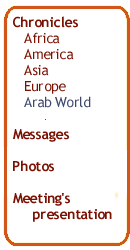|

- Cronicle
of the day
- Cronicle
June, 21th
- Cronicle June, 22th
- Cronicle
June, 23th
|
So Our Region Is Not Converted
into a Cemetery for Forces of a Peace That Has Gone Astray,
and for Peace to Have a Real Future
Three speeches -- Dr Maher Cherif, Palestinian
researcher living in Syria; Dr Mahdi el Hafez (Iraq), Dr
Awatef Abd El Rahman (Egypt) -- have identified the restrictions
on the development of a true project for a 'peace' that
is just and equitable in the region, and what is at stake
today for Arab societies in this millennium. Among the numerous
restrictions, factors relative to Israeli politics and society,
factors that are intrinsic to Arab societies in general
and the positions adopted by the major international powers.
At the Israeli level
=============
- The politics of 'fait accompli' adopted
by the Israeli Government (of both Barak and Sharon), which
turns its back to all the United Nations resolutions (194,
242, 338).
- The prevailing racism among members of the Israeli society
against the Arabs living among them.
- The ongoing provocation of the Palestinians by the Israeli
authorities
(extension of the colonies, Sharon's visit to the Promenade
in Jerusalem, the refusal to withdraw Israeli forces from
the occupied territories, etc.)
- The lack of maturity in Israeli society, which constitutes
a shackle on the construction of a true opinion supporting
a fair peace process.
At the Arab level
============
- The division among the Arab states and
their permanent preoccupation with holding their own has
fragmented the social dynamics and isolated the people.
All efforts, therefore, to build efficient solidarity networks
and democratic societies have come to nothing.
- The authoritarian regimes have, at the same time, marginalized
the intellectuals and diminished their role in society by
depriving them of freedom of expression and of action. This
attitude has meant, on the one hand, the prosecution of
all forms of opposition to the powers that be and a brain
drain to foreign countries. The authoritarian regimes are
equally impoverished by the corrupting and bureaucratic
potential of their societies,the poor allocation of budgets
(emphasizing defense expenditure over and above education,
scientific research and development) and the marginalization
and devaluation of the role of women.
At the international level
=================
- The problems of debt for the economies
of the Arab countries
- The lack of a political will among the major international
powers to find a solution to the conflict that is tearing
Palestine apart.
- The maintenance of an embargo against Iraq and the adoption
of an attitude that constitutes a double standard with regard
to human-rights and justice issues.
- The impact of globalization and the marginalization of
the third world, including the Arab world.
- The favorable attitude of the European Union and the blindness
of other Western countries vis-à-vis Israel despite
its colonial policies (concession of significatn funding
and aid).
- The role of the media in the handling of information concerning
the Arab countries, in particular the Israeli-Palestinian
conflict and the situation in Iraq.
The challenges posed today
====================
Going beyond a legitimate resistance to
oppression and injustice, the Arab societies need to establish
a common front with a civilizational project shared and
built on the historical knowledge of Arab culture This cannot
be done without:
- An opening up to the outside world and an objective and
constructive self-criticism.
- The introduction of reforms for a more significant and
overall democratization of society.
- The development of a capacity to look to the future and
the acquisition of the necessary technological tools.
- A reduction in military spending
- The development of a coherent economic program inspired
by experience and offering perspectives for the development
of the younger populations.
- A better utilization of communications and media, on the
one hand to present a true image to the outside of the Arab
world and, on the other hand, to build a collective awareness
and an Arab opinion in relation to the great debates taking
place in different societies and the challenges posed for
this millennium.
- From Saida, South Lebanon, 22 June 2001
- Continental Meeting of the Arab
World
by Nadia Leïla Aïssaoui <nadia@echo.org>
|


